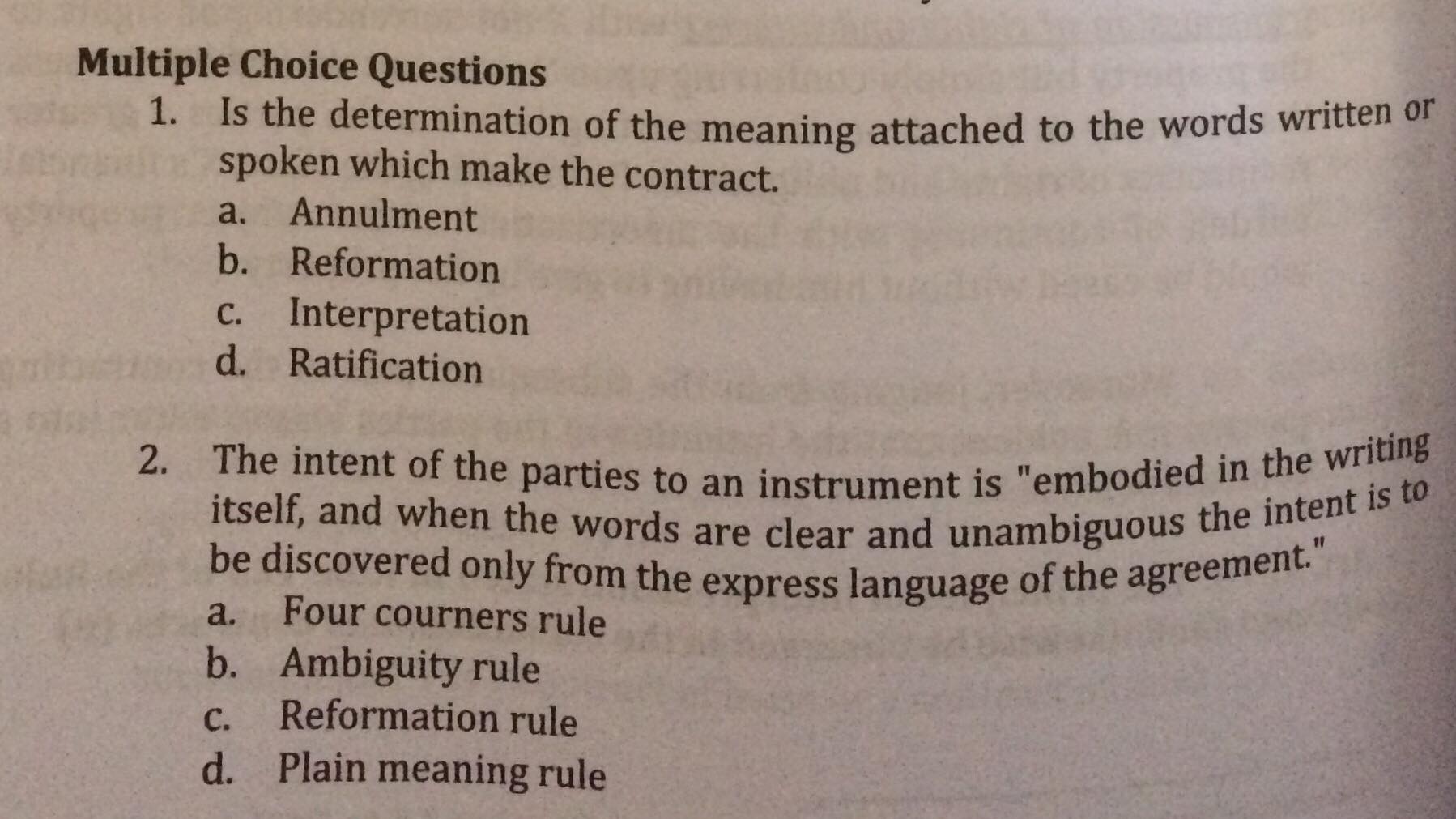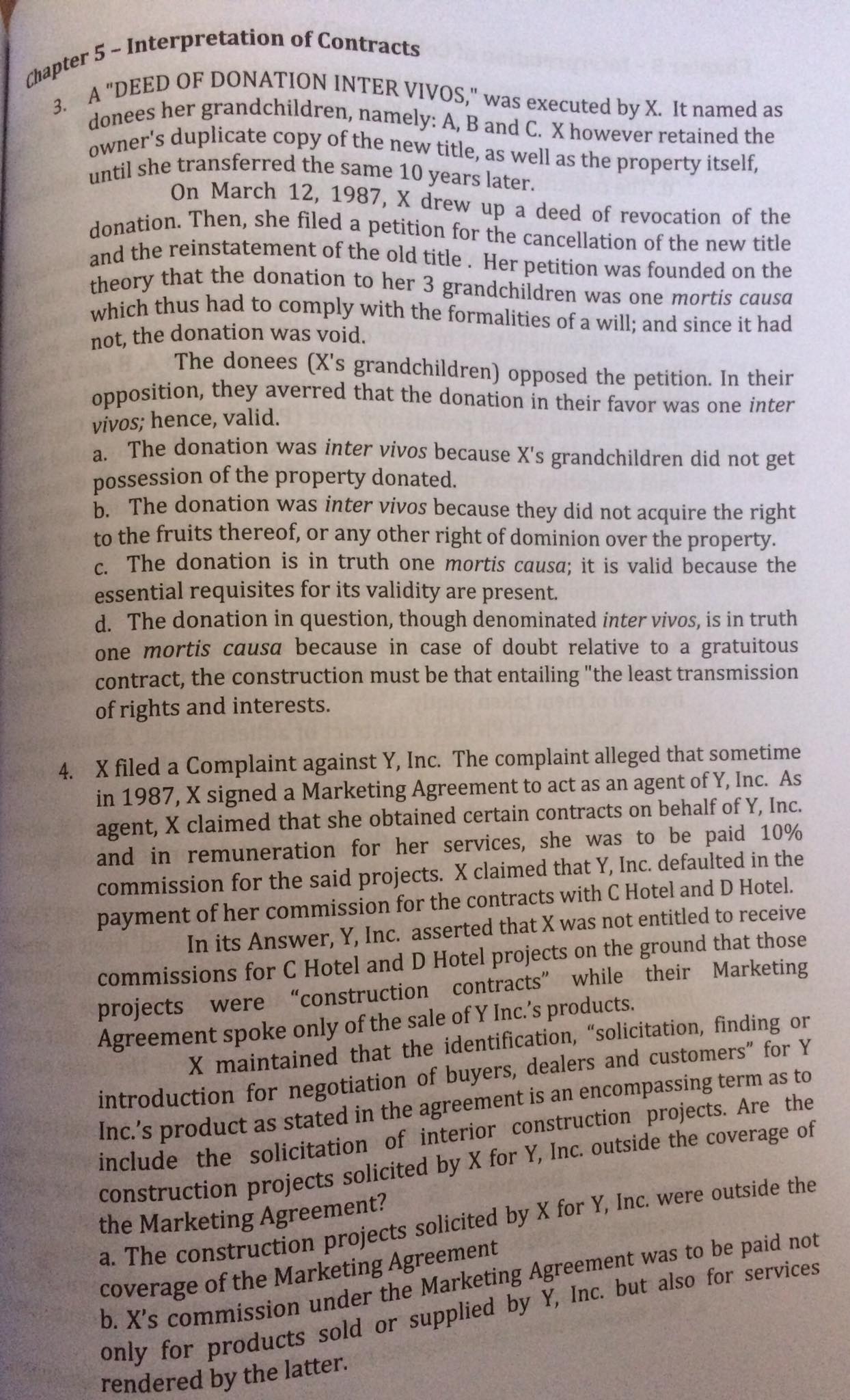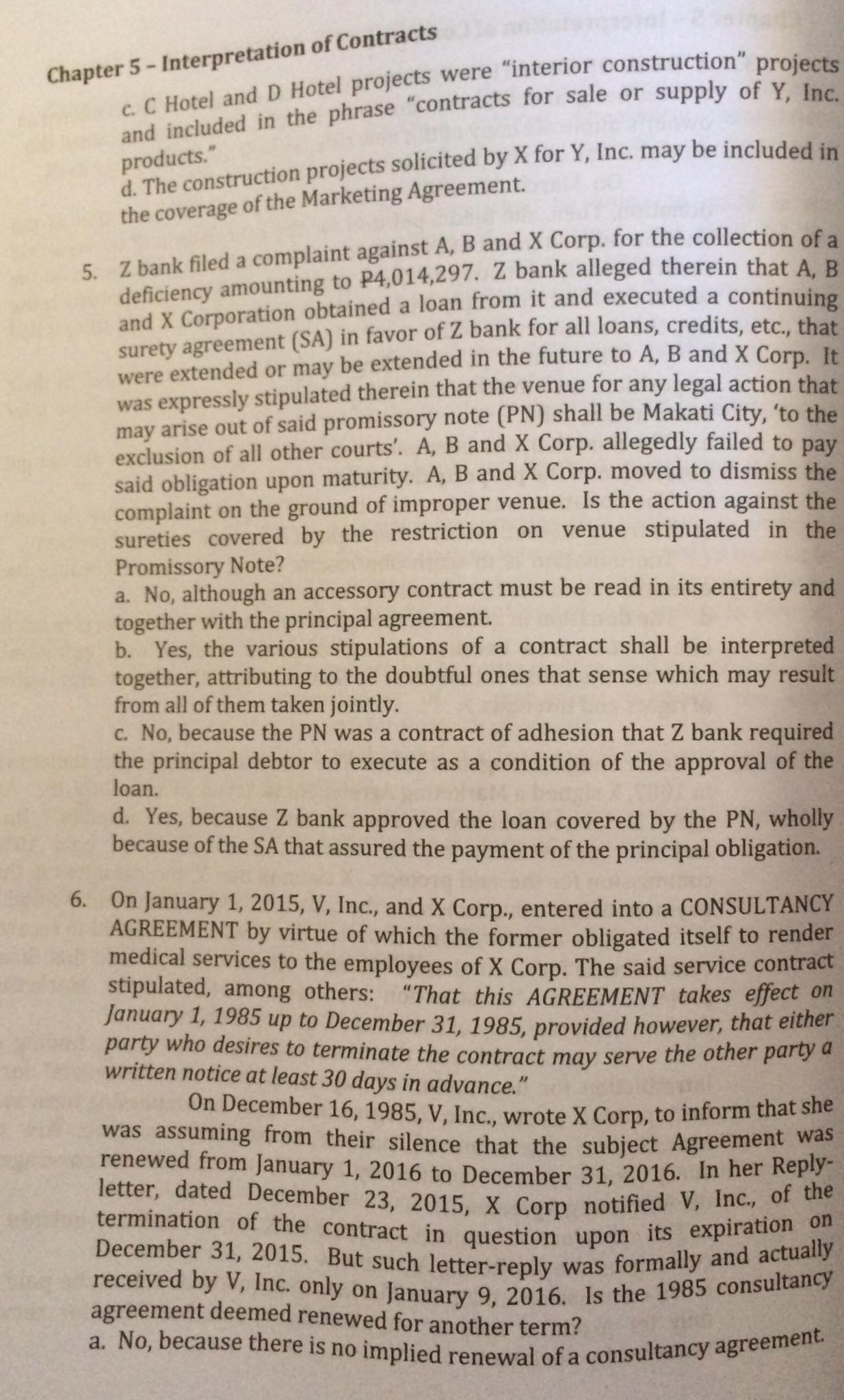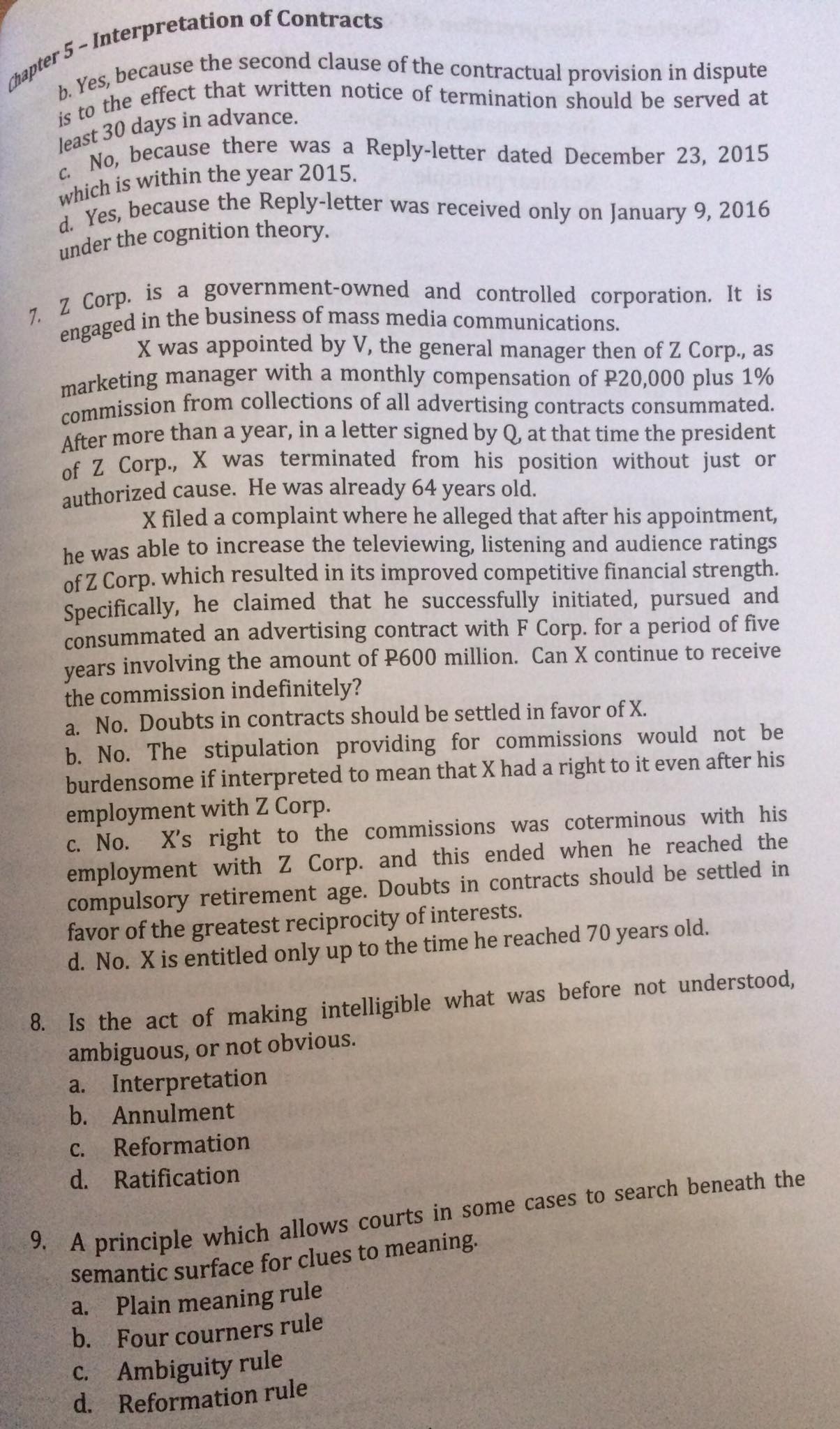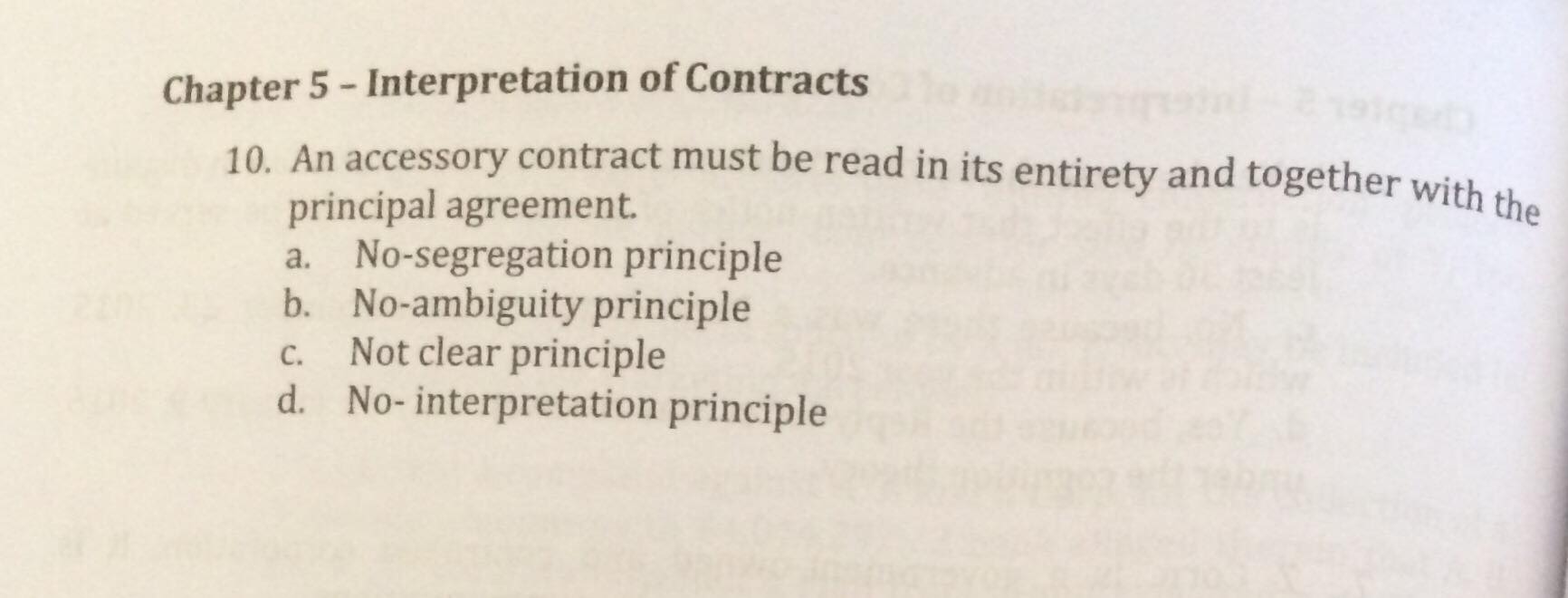Obligations and Contracts. Multiple choice 1-10 NEED
Multiple Choice Questions 1. Is the determination of the meaning attached to the words written or spoken which make the contract. a. Annulment b. Reformation C. Interpretation d. Ratification 2. The intent of the parties to an instrument is "embodied in the writing itself, and when the words are clear and unambiguous the intent is to be discovered only from the express language of the agreement." a. Four courners rule b. Ambiguity rule c. Reformation rule d. Plain meaning ruleChapter 5 - Interpretation of Contracts A "DEED OF DONATION INTER VIVOS," was executed by X. It named as donees her grandchildren, namely: A, B and C. X however retained the owner's duplicate copy of the new title, as well as the property itself, until she transferred the same 10 years later. On March 12, 1987, X drew up a deed of revocation of the donation. Then, she filed a petition for the cancellation of the new title and the reinstatement of the old title . Her petition was founded on the theory that the donation to her 3 grandchildren was one mortis causa which thus had to comply with the formalities of a will; and since it had not, the donation was void. The donees (X's grandchildren) opposed the petition. In their opposition, they averred that the donation in their favor was one inter vivos; hence, valid. a. The donation was inter vivos because X's grandchildren did not get possession of the property donated. b. The donation was inter vivos because they did not acquire the right to the fruits thereof, or any other right of dominion over the property. c. The donation is in truth one mortis causa; it is valid because the essential requisites for its validity are present. d. The donation in question, though denominated inter vivos, is in truth one mortis causa because in case of doubt relative to a gratuitous contract, the construction must be that entailing "the least transmission of rights and interests. 4. X filed a Complaint against Y, Inc. The complaint alleged that sometime in 1987, X signed a Marketing Agreement to act as an agent of Y, Inc. As agent, X claimed that she obtained certain contracts on behalf of Y, Inc. and in remuneration for her services, she was to be paid 10% commission for the said projects. X claimed that Y, Inc. defaulted in the payment of her commission for the contracts with C Hotel and D Hotel. In its Answer, Y, Inc. asserted that X was not entitled to receive commissions for C Hotel and D Hotel projects on the ground that those projects were "construction contracts" while their Marketing Agreement spoke only of the sale of Y Inc.'s products. X maintained that the identification, "solicitation, finding or introduction for negotiation of buyers, dealers and customers" for Y Inc.'s product as stated in the agreement is an encompassing term as to include the solicitation of interior construction projects. Are the construction projects solicited by X for Y, Inc. outside the coverage of the Marketing Agreement? a. The construction projects solicited by X for Y, Inc. were outside the coverage of the Marketing Agreement b. X's commission under the Marketing Agreement was to be paid not only for products sold or supplied by Y, Inc. but also for services rendered by the latter.Chapter 5 - Interpretation of Contracts c. C Hotel and D Hotel projects were "interior construction" projects and included in the phrase "contracts for sale or supply of Y, Inc. products." d. The construction projects solicited by X for Y, Inc. may be included in the coverage of the Marketing Agreement. 5. Z bank filed a complaint against A, B and X Corp. for the collection of a deficiency amounting to P4,014,297. Z bank alleged therein that A, B and X Corporation obtained a loan from it and executed a continuing surety agreement (SA) in favor of Z bank for all loans, credits, etc., that were extended or may be extended in the future to A, B and X Corp. It was expressly stipulated therein that the venue for any legal action that may arise out of said promissory note (PN) shall be Makati City, 'to the exclusion of all other courts'. A, B and X Corp. allegedly failed to pay said obligation upon maturity. A, B and X Corp. moved to dismiss the complaint on the ground of improper venue. Is the action against the sureties covered by the restriction on venue stipulated in the Promissory Note? a. No, although an accessory contract must be read in its entirety and together with the principal agreement. b. Yes, the various stipulations of a contract shall be interpreted together, attributing to the doubtful ones that sense which may result from all of them taken jointly. c. No, because the PN was a contract of adhesion that Z bank required the principal debtor to execute as a condition of the approval of the loan. d. Yes, because Z bank approved the loan covered by the PN, wholly because of the SA that assured the payment of the principal obligation. 6. On January 1, 2015, V, Inc., and X Corp., entered into a CONSULTANCY AGREEMENT by virtue of which the former obligated itself to render medical services to the employees of X Corp. The said service contract stipulated, among others: "That this AGREEMENT takes effect on January 1, 1985 up to December 31, 1985, provided however, that either party who desires to terminate the contract may serve the other party a written notice at least 30 days in advance." On December 16, 1985, V, Inc., wrote X Corp, to inform that she was assuming from their silence that the subject Agreement was renewed from January 1, 2016 to December 31, 2016. In her Reply- letter, dated December 23, 2015, X Corp notified V, Inc., of the termination of the contract in question upon its expiration on December 31, 2015. But such letter-reply was formally and actually received by V, Inc. only on January 9, 2016. Is the 1985 consultancy agreement deemed renewed for another term? a. No, because there is no implied renewal of a consultancy agreement.Chapter 5 - Interpretation of Contracts Yes, because the second clause of the contractual provision in dispute is to the effect that written notice of termination should be served at least 30 days in advance. "No, because there was a Reply-letter dated December 23, 2015 which is within the year 2015. . Yes, because the Reply-letter was received only on January 9, 2016 under the cognition theory. Z Corp. is a government-owned and controlled corporation. It is engaged in the business of mass media communications. X was appointed by V, the general manager then of Z Corp., as marketing manager with a monthly compensation of P20,000 plus 1% commission from collections of all advertising contracts consummated. After more than a year, in a letter signed by Q at that time the president of Z Corp., X was terminated from his position without just or authorized cause. He was already 64 years old. X filed a complaint where he alleged that after his appointment, he was able to increase the televiewing, listening and audience ratings of Z Corp. which resulted in its improved competitive financial strength. Specifically, he claimed that he successfully initiated, pursued and consummated an advertising contract with F Corp. for a period of five years involving the amount of P600 million. Can X continue to receive the commission indefinitely? a. No. Doubts in contracts should be settled in favor of X. b. No. The stipulation providing for commissions would not be burdensome if interpreted to mean that X had a right to it even after his employment with Z Corp. c. No. X's right to the commissions was coterminous with his employment with Z Corp. and this ended when he reached the compulsory retirement age. Doubts in contracts should be settled in favor of the greatest reciprocity of interests. d. No. X is entitled only up to the time he reached 70 years old. 8. Is the act of making intelligible what was before not understood, ambiguous, or not obvious. a. Interpretation b. Annulment C. Reformation d. Ratification 9. A principle which allows courts in some cases to search beneath the semantic surface for clues to meaning. a. Plain meaning rule b. Four courners rule C. Ambiguity rule d. Reformation ruleChapter 5 - Interpretation of Contracts 10. An accessory contract must be read in its entirety and together with the principal agreement. a. No-segregation principle b. No-ambiguity principle c. Not clear principle d. No- interpretation principle
